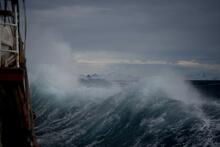“What is a Shipwreck if God is the Ocean?”: Seeking the Presence of God, Under Conditions of Covid
I discovered the question in my title in an archive many years ago, scribbled in the margins of a text I was studying. The archive was high up in a fortress-like medieval tower that overlooked a beautiful valley with a river snaking through it. It was a bright and peaceful summer day. Nothing spoke of a shipwreck at that moment—the question, however, did speak deeply to me, and I copied it into my notebook. I have no memory of the text I was studying that afternoon, but to this day, the scribbled question has accompanied my life’s pilgrimage.[1]
Whether in smooth sailing or in a stunning shipwreck, I cannot fall deeper than into that Mystery of love at the heart of the universe.
The question also anchored my thinking and praying in the many months of journeying through the global Covid pandemic. The image of a shipwreck is of course only one of many images that could be invoked to describe the experience of suddenly having to face something previously unbelievable; in this case, a global pandemic that brought life-as-we-knew-it to a screeching halt in no time. The experience of an earthquake or a tsunami must come close, and the vision of a “valley of the shadow of the virus” offers a compelling biblically rooted image (Psalm 23:4).
Yet, whatever image speaks to each of us most deeply, our individual paths have been distinct, even as we all had to journey through Covid-dominated months. Paths have differed not least because they were shaped by factors that marked pre-Covid lives (e.g., where we lived, whether we had access to health care, and job security, etc.). Much ink has been spilled analyzing and documenting these Covid months, and while I consider this important work, I am also convinced that no one is well served by theologians soaking up all the insights from other interpreters and experts (e.g., scientists, public and mental health providers, educators, etc.), only then to add a thin layer of spiritual glaze. Identifying and charting another path, however, is not easy. Seeking the presence of God in the midst of a global pandemic, or any other shipwreck of life for that matter, does not yield immediate, concrete, measurable results.
As in everyday life, inquiring into the presence of God is about pondering a Mystery—and about enduring the deep un-knowing that accompanies any encounter with that Mystery. Maybe that is the reason that I appreciate that the sentence—“What is a Shipwreck if God is the Ocean?”— comes in the form of a question. That invites more questions: What if, in the midst of life’s shipwrecks, God comes to me as the ocean—that is, as the ultimate reality that undergirds all journeys, whether they are smooth, storm-tossed, or even spectacularly wrecked? And what on earth could that mean? One answer might come with a biblical claim, namely that God is the all-encompassing reality in which we live and move and have our being (Acts 17:28); and that all-encompassing reality is the Mystery of love, at the heart of the universe. Whether in smooth sailing or in a stunning shipwreck, I cannot fall deeper than into that Mystery.
The More-Than-Human World
What, then, about the presence of that Mystery, God, in the midst of a global pandemic? The above claim obviously must not be read as an invitation simply to drown ourselves in whatever shipwreck threatens our lives. It is helpful, here, to remember another marine image and its wisdom: when your boat is getting tossed around and dangerously close to rocks, row away from the rocks with all your might, as if everything depended on you. At the same time, pray with all your might, as if everything depended on God. I take from this the imperative never to resign myself to a looming shipwreck until both my “rowing” and my “praying” have been exhausted.
What this two-fold effort looked like under the conditions of Covid can only be told in individual stories, I believe. For me, this effort meant much searching, especially early on. I remember re-reading the psalms, systematically, one every morning, looking for and praying with images of God as Protector. Imagine what it felt like when I got to Psalm 91:3 and 6 one morning in these Covid months (and this was a psalm I thought I knew well, since it regularly appears in the Liturgy of the Hours)! I also found comfort in discovering a rich tradition of past prayers against “pestilence” that I had simply been oblivious to before Covid. Maybe most importantly, I discovered ways of inhabiting a larger space of worship than human assemblies (the latter were simply shut down, in my part of the world, during Lent of 2020). I was not the only one, of course, who in response to the necessity of social distancing found her relationship with the more-than-human world deepen. Fortunately for me, this deepening intertwined with my scholarly work in liturgical studies. I came to see how Christian worship had always been about “a community of living persons not all of whom are human,”[2] and that that had been true long before the Environmental Humanities, Animal Studies, and Interspecies Studies emerged in the academy. Liturgical practices, after all, have been “multispecies” for millennia.
Deeper into the Heart of God
To begin with, as Christians, we envision an encounter in worship with an ultimate “Other,” under liturgical signs. We also include those who have gone before: the saints, and our beloved dead. And we know ourselves to sing “in the presence of the angels” (Psalm 138:1). We even gratefully acknowledge that the sparrow finds a home and the swallow a nest to settle her young in God’s Temple (Psalm 84:4), and that birds listen to sermons, at least when St. Francis of Assisi is the preacher. Living through the Covid months, this creation-wide liturgical tradition became a potent heritage for me to embrace and live into. Indeed, I found a vast and beautiful world to explore, in the ancient vision of worship in communion with everything created.
Looking back over two years of living with the pandemic, then, there is really only one key recognition for me, through all the uncertainty, heartache, and losses. The recognition is that even in the greatest of turmoil, the key question of life lived coram Deo (“before God,” in the presence of God) remains strangely stable: how to journey deeper into the Mystery that is the ultimate end of life’s pilgrimage, God? How to journey deeper into the heart of God even in and through a shipwreck? But then, what is a shipwreck, if God is the ocean?
Teresa Berger is Professor of Liturgical Studies and Thomas E. Golden Jr. Professor of Catholic Theology at YDS. A native of Germany, she holds doctorates in both liturgical studies and constructive theology, and she writes about how these disciplines intersect with gender theory. Her most recent books include @ Worship: Liturgical Practices in Digital Worlds (Routledge, 2017) and, as editor, Full of Your Glory: Liturgy, Cosmos, Creation (Liturgical Press Academic, 2019). She also posts at the liturgy blog Pray Tell.
[1] Musician and composer Lorna Collingridge set the text to music for our co-produced CD-ROM “Ocean Psalms: Meditations, Stories, Prayers, Songs & Blessing from the Sea” in 2008. Sadly, “Ocean Psalms” was constructed in a now outdated technology (although the CD-ROM itself continues to work). Text as set to music by Lorna Collingridge:

[2] I am (mis)using the terminology of Graham Harvey here, who describes his (positive) understanding of animism with these words, e.g., in his essay “Animals, Animists, and Academics,” Zygon 41 (2006), pp. 9-19.

